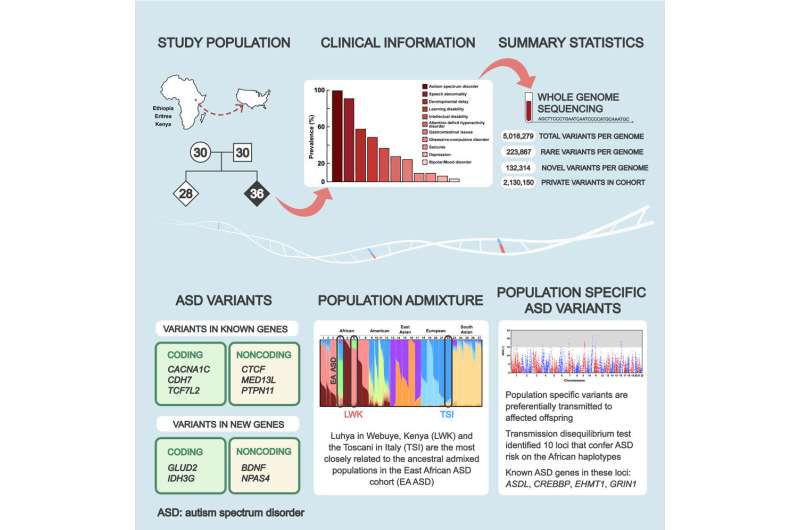This article has been reviewed according to Science X's editorial process and policies. Editors have highlighted the following attributes while ensuring the content's credibility:
fact-checked
peer-reviewed publication
trusted source
proofread
New study sheds light on complex genetics of autism in East African families

UT Southwestern Medical Center researchers have identified hundreds of genomic variants associated with autism spectrum disorder (ASD) in East African families who have a markedly higher prevalence of the neurodevelopmental condition than other populations worldwide. The study, published in Cell Genomics, is the first to investigate the genetics of ASD in an African population, an important step toward decreasing racial and ethnic health disparities for this condition, the authors said.
"The overwhelming majority of all genetic ASD studies done to date have focused on exclusively white populations with European ancestry," said Maria Chahrour, Ph.D., Associate Professor of Neuroscience and Psychiatry at UTSW in the Eugene McDermott Center for Human Growth and Development. "There are growing efforts in the field to look at the genetics of ASD in African populations. We are happy and proud to be the first to publish on this important topic."
Among 8-year-olds in the U.S. in 2020, an estimated 1 in 36 has been identified as having ASD, according to data from the Autism and Developmental Disabilities Monitoring Network. A higher prevalence among those of East African descent is thought to have genetic roots, but the exact cause has not been documented, said Dr. Chahrour, who is also with the Center for the Genetics of Host Defense and the Peter O'Donnell Jr. Brain Institute at UTSW.
To investigate, Dr. Chahrour partnered with Leah Seyoum-Tesfa, RN, M.Ed., an Irving, Texas-based nurse who founded Reaching Families Advocacy and Support Group, which supports East African immigrants whose children have developmental disabilities including ASD. The pair recruited 33 East African immigrant families who have at least one child with autism. The parents are Ethiopian, Eritrean, or both, and one family is Kenyan. All live in the Dallas-Fort Worth area.
The researchers performed whole-genome sequencing on blood samples donated by 129 family members, including 36 children with ASD. They then searched for variations in individual genes or larger sections of chromosomes, called loci, that were specific to the children with ASD.
Their analysis turned up more than 2.1 million genetic variants in these study participants that had never been reported in other databases. Among the 36 children, the researchers identified variants in the protein-coding portion of 12 genes that had already been associated with ASD in other studies, and the protein-coding portion of eight genes previously associated with other neurodevelopmental disorders. They also discovered 12 variants in non-coding regions of the genome thought to regulate genes associated with ASD and other neurodevelopmental disorders.
In addition, the researchers discovered variants affecting other genes that had never before been associated with ASD. Future studies will be necessary to determine whether these variants are causative, Dr. Chahrour said.
Using a technique called admixture mapping, she and her colleagues traced the 33 East African families to two different ancestral populations, of which the closest relatives are ancestors of Kenyans and Italians. The researchers linked the loci that tracked with ASD to parts of the genome inherited from the African ancestors, but not the Europeans.
Although these findings represent an initial probe into ASD genetics in East African people, Dr. Chahrour hopes they will contribute to the interpretation of genetic tests that could help speed the diagnostic process. Wait times at many U.S. centers qualified to diagnose ASD are currently in excess of a year, so better testing could translate into earlier access to support services that could improve outcomes.
"The earlier that children with ASD receive behavioral, speech, and other support services, the more effective these services are. However, research has shown that minority and underserved populations often don't have access to earlier diagnosis and services," Dr. Chahrour said. "We are contributing to bridging this gap as genetic findings make their way into the clinic. The findings mark an important milestone in our quest for a deeper understanding of the complex genetics of ASD."
Other UTSW researchers who contributed to this study are Ashlesha Gogate, M.S., Kiran Kaur, Ph.D., Ashwani Kumar, M.S., Chao Xing, Ph.D., and Kimberly Goodspeed, M.D.
More information: Islam Oguz Tuncay et al, The genetics of autism spectrum disorder in an East African familial cohort, Cell Genomics (2023). DOI: 10.1016/j.xgen.2023.100322





















